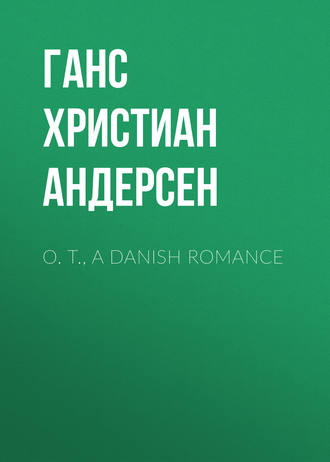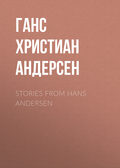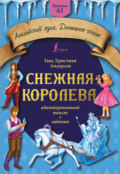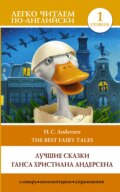
Ганс Христиан Андерсен
O. T., A Danish Romance
CHAPTER XLV
“Knowest thou the mountain and its cloudy paths? where the mule is seeking its misty way.”—GOETHE.
The letter was from Wilhelm; every line breathed life’s joy and gladness.
“MIA CARA SORELLA!
“Does it not sound beautifully? It is Italian! Now then, I am in that so-often-sung-of Paradise, but of the so much-talked-about blue air, I have as yet seen nothing of consequence. Here it is gray, gray as in Denmark. To be sure Otto says that it is beautiful, that we have the heaven of home above us, but I am not so poetical. The eating is good, and the filth of the people strikes one horribly after being in Switzerland, the enchanting Switzerland! Yes, there is nature! We have made a crusade through it, you may think. But now you shall hear about the journey, and the entrance into ‘la bella Italia,’ which is yet below all my expectations. I cannot at all bear these feeble people; I cannot endure this monk-odor and untruthfulness. We are come direct from the scenery of Switzerland, from clouds and glaciers, from greatness and power. We travelled somewhat hastily through the valley of the Rhone; the weather was gray, but the whole obtained therefrom a peculiar character. The woods in the lofty ridges looked like heather; the valley itself seemed like a garden filled with vegetables, vineyards, and green meadows. The clouds over and under one another, but the snow-covered mountains peeped forth gloriously from among them, It was a riven cloud-world which drove past,—the wild chase with which the daylight had disguised itself. It kissed in its flight Pissevache, a waterfall by no means to be despised. In Brieg we rested some time, but at two o’clock in the morning began again our journey over the Simplon. This is the journey which I will describe to you. Otto and I sat in the coupée. Fancy us in white blouses, shawl-caps, and with green morocco slippers, for the devil may travel in slippers—they are painful to the feet.
“We both of us have mustaches! I have seduced Otto. They become us uncommonly well, and give us a very imposing air; and that is very good now that we are come into the land of banditti, where we must endeavor to awe the robbers. Thus travelled we. It was a dark night, and still as death, as in the moment when the overture begins to an opera. Soon, indeed, was the great Simplon curtain to be rolled up, and we to behold the land of music. Immediately on leaving the city, the road began to ascend; we could not see a hand before us; around us tumbled and roared the water-courses,—it was as if we heard the pulse of Nature beat. Close above the carriage passed the white clouds; they seemed like transparent marble slabs which were slid over us. We had the gray dawn with us, whilst deep in the valley lay yet the darkness of night; in an hour’s time it began to show itself there among the little wooden houses.
“It is a road hewn out of the rocks. The giant Napoleon carried it through the backbone of the earth. The eagle, Napoleon’s bird, flew like a living armorial crest over the gigantic work of the master. There it was cold and gray; the clouds above us, the clouds below us, and in the middle space steep rocky walls.
“At regular distances houses (relais) are erected for the travellers; in one of these we drank our coffee. The passengers sat on benches and tables around the great fire-place, where the pine logs crackled. More than a thousand names were written on the walls. I amused myself by writing mamma’s, yours, Sophie’s, and Eva’s; now they stand there, and people will fancy that you have been on the Simplon. In the lobby I scratched in that of Mamsell, and added ‘Without her workbox.’ Otto was thinking about you. We talked in our, what the rest would call ‘outlandish speech,’ when I all at once exclaimed, ‘It is really Eva’s birthday!’ I remembered it first. In Simplon town we determined to drink her health.
“We set off again. Wherever the glaciers might fall and destroy the road the rocks have been sprung, and formed into great galleries, through which one drives without any danger. One waterfall succeeds another. There is no balustrade along the road, only the dark, deep abyss where the pine-trees raise themselves to an immense height, and yet only look like rafters on the mighty wall of rock. Before we had advanced much further, we came to where trees no longer grew. The great hospice lay in snow and cloud. We came into a valley. What solitude! what desolation! only naked crags! They seemed metallic, and all had a green hue. The utmost variety of mosses grew there; before us towered up an immense glacier, which looked like green bottle-glass ornamented with snow. It was bitterly cold here, and in Simplon the stoves were lighted; the champagne foamed, Eva’s health was drunk, and, only think! at that very moment an avalanche was so gallant as to fall. That was a cannonade; a pealing among the mountains! It must have rung in Eva’s ears. Ask her about it. I can see how she smiles.
“We now advanced toward Italy, but cold was it, and cold it remained. The landscape became savage; we drove between steep crags. Only fancy, on both sides a block of granite several miles long, and almost as high, and the road not wider than for two carriages to pass, and there you have a picture of it. If one wanted to see the sky, one was obliged to put one’s head out of the carriage and look up, and then it was as if one looked up from the bottom of the deepest well, dark and narrow. Every moment I kept thinking, ‘Nay, if these two walls should come together!’ We with carriage and horses were only like ants on a pebble. We drove through the ribs of the earth! The water roared; the clouds hung like fleeces on the gray, craggy walls. In a valley we saw boys and girls dressed in sheep-skins, who looked as wild as if they had been brought up among beasts.
“Suddenly the air became wondrously mild. We saw the first fig-tree by the road-side. Chestnuts hung over our heads; we were in Isella, the boundary town of Italy. Otto sang, and was wild with delight; I studied the first public-house sign, ‘Tabacca e vino.’
“How luxuriant became the landscape! Fields of maize and vineyards! The vine was not trained on frames as in Germany!—no, it hung in luxuriant garlands, in great huts of leaves! Beautiful children bounded along the road, but the heavens were gray, and that I had not expected in Italy. From Domo d’Ossola, I looked back to my beloved Switzerland! Yes, she turns truly the most beautiful side toward Italy. But there was not any time for me to gaze; on we must. In the carriage there sat an old Signorina; she recited poetry, and made: with her eyes ‘che bella cosa!’
“About ten o’clock at night we were in Baveno, drank tea, and slept, whilst Lago Maggiore splashed under our window. The lake and the Borromaen island we were to see by daylight.
“‘Lord God!’ thought I, ‘is this all?’ A scene as quiet and riant as this we—have at home! Funen after this should be called Isola bella, and the East Sea is quite large enough to be called Lago Maggiore. We went by the steamboat past the holy Borromeus41 to Sesto de Calende; we had a priest on board, who was very much astonished at our having come from so far. I showed him a large travelling map which we had with us, where the Lago Maggiore was the most southern, and Hamburg the most northern point. ‘Yet still further off,’ said I; ‘more to the north!’ and he struck his hands together when he perceived that we were from beyond the great map. He inquired whether we were Calvinists.
“We sped through glorious scenes. The Alps looked like glass mountains in a fairy tale. They lay behind us. The air was warm as summer, but light as on the high mountains. The women wafted kisses to us; but they were not handsome, the good ladies!
“Tell the Kammerjunker that the Italian pigs have no bristles, but have a coal-black shining skin like a Moor.
“Toward night we arrived at Milan, where we located ourselves with Reichmann, made a good supper, and had excellent beds; but I foresee that this bliss will not last very long. On the other side of the Apennines we shall be up to the ears in dirt, and must eat olives preserved in oil; but let it pass. Otto adapts himself charmingly to all things; he begins to be merry—that is, at times! I, too, have had a sort of vertigo—I am taken with Italian music; but then there is a difference in hearing it on the spot. It has more than melody; it has character. The luxuriance in nature and in the female form; the light, fluttering movement of the people, where even pain is melody, has won my heart and my understanding. Travelling changes people!
“Kiss mamma for me! Tell Eva about the health-drinking on the Simplon, and about the falling avalanche: do not forget that; that is precisely the point in my letter! Tell me too how Eva blushed, and smiled, and said, ‘He thought of me!’ Yes, in fact it is very noble of me. My sweet Sophie and her Kammerjunker, Jakoba and Mamsell, must have a bouquet of greetings, which you must arrange properly. If you could but see Otto and me with our mustaches! We make an impression, and that is very pleasant. If the days only did not go on so quickly—if life did not pass so rapidly!
“‘Questa vita mortale
Che par si bella, a quasi piuma al vento
Che la porta a la perde in un momento,’42
as we Italians say. Cannot you understand that?
“Thy affectionate brother,“WILHELM.”
Otto wrote in the margin of the letter, “Italy is a paradise! Here the heavens are three times as lofty as at home. I love the proud pine-trees and the dark-blue mountains. Would hat everybody could see the glorious objects!”
Wilhelm added to this, “What he writes about the Italian heavens is stupid stuff. Ours at home is just as good. He is an odd person, as you very well know!
“‘Addic! A rivederci!’”
CHAPTER XLVI
“Thou art master in thy world.
Hast thou thyself, then thou hast all!”
—WAHLMANN.
In the summer of 1834 the friends had been absent for two years. In the last year, violet-colored gillyflowers had adorned a grave in the little country church-yard.
“A heart which overflowed with love,
Was gone from earth to love and God,”
were the words which might be read upon the grave-stone.
A withered bouquet of stocks had been found by Louise, with the certificate of Eva’s birth and her hymn-book. These were the flowers which Wilhelm had given her that evening at Roeskelde. Among the dry leaves there lay a piece of paper, on which she had written,—“Even like these flowers let the feelings die away in my soul which these flowers inspire it with!”
And now above her grave the flowers which she had loved sent forth their fragrance.
It was Sunday; the sun shone warm; the church-goers, old and young, assembled under the great lime-tree near Eva’s grave. They expected their young preacher, who to-day was to preach for the third time.
The gentlefolks would also certainly be there, they thought, because the young Baron was come back out of foreign parts, and with him the other gentleman, who certainly was to have Miss Louise.
“Our new preacher is worth hearing,” said one of the peasant women; “such a young man, who actually preaches the old faith! as gentle and as meek in conversation as if he were one of ourselves! And in the pulpit, God help us! it went quite down into my legs the last time about the Day of Judgment!”
“There is Father!”43 exclaimed the crowd, and the heads of old and young were uncovered. The women courtesied deeply as a young man in priest-robes went into the church-door. His eyes and lips moved to a pious smile, the hair was smooth upon his pale forehead.
“Good day, children!” said he.
It was Hans Peter. He had, indeed, had “the best characters,” and thus had received a good living, and now preached effectively about the devil and all his works.
The singing of the community sounded above the grave where the sun shone, where the stocks sent forth their fragrance, and where Eva slept: she whose last wish was to live.
“There is no love i’ th’ grave below,
No music, warmth, or pleasure.”
The earth lay firm and heavy upon her coffin-lid.
During the singing of the second hymn a handsome carriage drove up before the church-yard. The two friends, who were only just returned to their home in Denmark, entered the church, together with the mother and Louise.
Travelling and two years had made Wilhelm appear somewhat older; there was a shadow of sadness in his otherwise open and life-rejoicing countenance. Otto looked handsomer than formerly; the gloomy expression in his face was softened, he looked around cheerfully, yet thoughtfully, and a smile was on his lips when he spoke with Louise.
There was in the sermon some allusion made to those who had returned home; for the rest, it was a flowery discourse interlarded with many texts from the Bible. The community shed tears; the good, wise people, they understood it to mean that their young lord was returned home uninjured from all the perils which abound in foreign lands.
The preacher was invited to dinner at the hall. The Kammerjunker and Sophie came also, but it lasted “seven long and seven wide,” as Miss Jakoba expressed herself, before they could get through all the unwrapping and were ready to enter the parlor, for they had with them the little son Fergus, as he was called, after the handsome Scotchman in Sir Walter Scott’s “Waverley.” That was Sophie’s wish. The Kammerjunker turned the name of Fergus to Gusseman, and Jacoba asserted that it was a dog’s name.
“Now you shall see my little bumpkin!” said he, and brought in a square-built child, who with fat, red cheeks, and round arms, stared around him. “That is a strong fellow! Here is something to take hold of! Tralla-ralla-ralla!” And he danced him round the room.
Sophie laughed and offered her hand to Otto.
Wilhelm turned to Mamsell. “I have brought something for you,” said he, “something which I hope may find a place in the work-box—a man made of very small mussel-shells; it is from Venice.”
“Heavens! from all that way off!” said she and courtesied.
After dinner they walked in the garden.
Wilhelm spoke already of going the following year again to Paris.
“Satan!” said the Kammerjunker. “Nay, I can do better with Mr. Thostrup. He is patriotic. He lays out his money in an estate. It is a good bargain which you have made, and in a while will be beautiful; there is hill and dale.”
“There my old Rosalie shall live with me,” said Otto; “there she will find her Switzerland. The cows shall have bells on their necks.”
“Lord God! shall they also be made fools of?” exclaimed Jakoba: “that is just exactly as if it were Sophie.”
They went through the avenue where Otto two years before had wept, and had related all his troubles to Louise. He recollected it, and a gentle sigh passed his lips whilst his eyes rested on Louise.
“Now, do you feel yourself happy at home?” asked she; “a lovelier summer’s day than this you certainly have not abroad.”
“Every country has its own beauties,” replied Otto. “Our Denmark is not a step child of Nature. The people here are dearest to me, for I am best acquainted with them. They, and not Nature, it is that makes a land charming. Denmark is a good land; and here also will I look for my happiness.” He seized Louise’s hand; she blushed, and was silent. Happy hours succeeded.
This circle assembled every Sunday; on the third, their delight was greater, was more festal than on any former occasion.
Nature herself had the same expression. The evening was most beautiful; the full moon shone, magnificent dark-blue clouds raised themselves like mountains on the other side the Belt. Afar off sailed the ships, with every sail set to catch the breeze.
Below the moon floated a coal-black cloud, which foretold a squall.
A little yacht went calmly over the water. At the helm sat a boy—half a child he seemed: it was Jonas, the little singing-bird, as Wilhelm had once called him. Last Whitsuntide he had been confirmed, and with his Confirmation all his singer-dreams were at an end: but that did not trouble him; on the contrary, it had lain very heavy upon his heart that he was not to be a fifer. His highest wish had been to see himself as a regimental fifer, and then he should have gone to his Confirmation in his red uniform, with a sabre at his side, and a feather in his hat half as tall as himself. Thus adorned, he might have gone with the girls into the King’s Garden and upon the Round Tower, the usual walk for poor children in Copenhagen. On Confirmation-day they ascend the high tower, just as if it were to gain from it a free view over the world. Little Jonas, however, was confirmed as a sailor, and he now sat at the helm on this quiet night.
Upon the deck lay two persons and slept; a third went tranquilly up and down. Suddenly he shook one of the sleepers, and caught hold on the sail. A squall had arisen with such rapidity and strength, that the vessel in a moment was thrown on her side. Mast and sail were below the water. Little Jonas uttered a shriek. Not a vessel was within sight. The two sleepers had woke in time to cling to the mast. With great force they seized the ropes, but in vain; the sail hung like lead in the water. The ship did not right herself.
“Joseph, Maria!” exclaimed one of them, a man with gray hairs and unpleasing features. “We sink! the water is in the hold!”
All three clambered now toward the hinder part of the vessel, where a little boat floated after. One of them sprang into it.
“My daughter!” cried the elder, and bent himself toward the narrow entrance into the cabin. “Sidsel, save thy life!” and so saying, he sprang into the boat.
“We must have my daughter out,” cried he. One of the ship’s cabin windows was under water; he burst in the other window.
“We are sinking!” cried he, and a horrible scream was heard within.
The old man was German Heinrich, who was about to come with this vessel from Copenhagen to Jutland: Sidsel was his daughter, and therefore he wished now to save her life a second time.
The water rushed more and more into the ship. Heinrich thrust his arm through the cabin-window, he grasped about in the water within; suddenly he caught hold on a garment, he drew it toward him; but it was only the captain’s coat, and not his daughter, as he had hoped.
“The ship sinks!” shrieked the other, and grasped wildly on the rope which held the boat fast: in vain he attempted to divide it with his pocket-knife. The ship whirled round with the boat and all. Air and water boiled within it, and, as if in a whirlpool, the whole sunk into the deep. The sea agitated itself into strong surges over the place, and then was again still. The moon shone tranquilly over the surface of the water as before. No wreck remained to tell any one of the struggle which there had been with death.
The bell tolled a quarter past twelve; and at that moment the last light at the hall was extinguished.
“I will go to Paris,” said Wilhelm, “to my glorious Switzerland; here at home one is heavy-hearted; the gillyflowers on the grave have an odor full of melancholy recollections. I must breathe the mountain air; I must mingle in the tumult of men, and it is quite the best in the world.”
Otto closed his eyes; he folded his hands.
“Louise loves me,” said he. “I am so happy that I fear some great misfortune may soon meet me; thus it used always to be. Whilst German Heinrich lives I cannot assure myself of good! If he were away, I should be perfectly tranquil, perfectly happy!”







